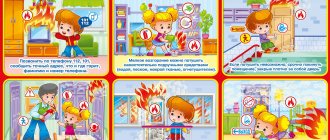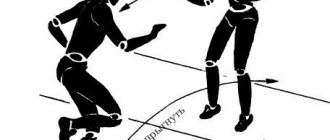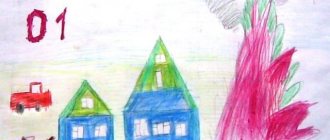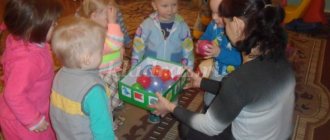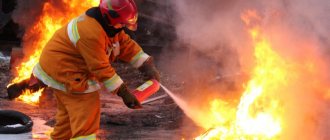It is no secret that fires most often occur due to the carelessness of people, and the most careless of us are children. This is why it is so important to introduce fire safety games for children from a very early age. Through play, kids learn to understand what objects can catch fire and what to do in a life-threatening situation.
At what age should fire safety rules be taught?
Dangers await people everywhere. At any moment an accident, fire, animal bite, etc. can happen. An adult has a certain model of behavior in this case, but a child does not. Therefore, it is so important to give him knowledge about possible threatening situations and objects. Children receive their first lessons in the family: “you can’t touch matches,” “it’s dangerous to approach the stove.” In the garden they deepen this knowledge.
It is recommended that children be introduced to fire safety rules from the age of 3 years. First, a series of introductory lessons are conducted to help you learn what is dangerous and what is not. Children learn to recognize fire hazards and handle them correctly. Later, starting from 4–5 years old, they learn to understand the interconnection of events: “a lit match can lead to a fire in the house, an unextinguished fire can burn a forest.”
Progress of the game:
The teacher gives the players cards drawn into 10 empty rectangles (playing fields, then shows the children a plot picture depicting the situation during a fire (a boy plays with matches, a girl ran out onto the balcony of a burning apartment, an iron was left unattended, children turned on the Christmas tree, etc.) The child who correctly described the situation covers the empty playing field with a picture ... The one who has the most closed fields wins.
2. Didactic game “ Card Quiz ”
Goal: to consolidate children's knowledge about fire safety rules . Develop memory, thinking, speech. Foster a sense of responsibility.
How to behave in case of fire?
At a young age, a child is not able to put out a fire and follow the rules that exist for adults.
Up to 6 years of age, children must know and follow only 3 points:
- Do not touch flammable objects.
- In case of fire, notify parents, neighbors, and teacher as soon as possible.
- Remain in the sight of adults, obey them in everything and try to behave calmly.
At 7–8 years old, when the child begins to be left unattended, he is told about the first fire safety rules:
- If the fire is small, try to extinguish it by throwing a thick cloth, pouring a pan of water or covering it with sand.
- If this does not help or the fire is large, immediately leave the dangerous place.
- Don't hide under the bed or in the closet, but if possible, get out of the house.
- If you are locked inside, close the windows and doors in the room where the fire occurred. Take your phone and lock yourself in the bathroom. Plug all the cracks and the hood.
- Call the fire department on 101 as soon as possible or ask adults to do this: neighbors, passers-by.
- Smoke is more dangerous than fire. If you feel like you're starting to choke, lie down on the floor. There is always less smoke at the bottom.
- Do not use the elevator during a fire - it may shut down. Just go down the stairs.
- Stay calm and don't try to leave the house through the window.
- When the firefighters arrive, obey them in everything and do not be afraid. They will help you.
Progress of the game:
The teacher lays out on the table, or puts in a beautifully decorated box, cards with questions on the topic of rules of behavior during a fire . The child who answers the question correctly The one who has the most chips at the end of the game wins.
Question options:
- Name the possible cause of the fire ;
-how to call the fire department correctly ;
- what to do if during a fire there is no way to call the fire brigade , and the routes out of the house are cut off by the fire ;
— is it possible to extinguish a fire without first calling the fire brigade ;
- what to do if there is a smell of gas in the house;
— is it possible to hide in a closet or under a table during a fire ;
— Is it possible to set poplar fluff on fire?
— Is it possible to create a draft during a fire by opening all windows and doors at the same time;
— is it possible to use the elevator during a fire in the house ;
first during : money, documents or yourself;
— how to properly leave a smoky room;
— Is it possible to play with matches and lighters and why.
3. Didactic game: “Name the causes of the fire ”
Goal: to develop knowledge about the causes of fire . Develop attention, memory, speech. Cultivate responsibility.
How to properly tell your child about fire safety rules?
You can tell your child as much as you like about safe behavior, but he is unlikely to remember and learn the instructions well. The main activity of children is play. It is easier to convey any information to children through play. In the game process, the child sees a clear example, acts out actions, and better understands cause-and-effect relationships.
There are several types of fire safety games for children:
- Didactic. They include games with objects and cards, board games and word games with riddles. For example, you need to cover a card with fire with a picture of water or continue the phrase: “I saw smoke - don’t yawn and call the firefighters... (call). “Don’t touch the stove with your hand if there’s a fire in it... (fire).”
- Movable. They help develop attentiveness, dexterity, and form a model of behavior in a life-threatening situation.
- Role-playing. Children take on the roles of firefighters, parents, children and solve the task.
It is recommended to support the oral material presented with a clear example. It is best to prepare a presentation with picture slides for the lesson. Instead of a dry presentation, you can use poetry:
“Mom-mouse ironed a suit for her daughter in the dark night. She got distracted and suddenly Forgot about the iron. This is no joke, it broke out in three minutes. Everything is in smoke, there is fumes all around, That’s how a fire happens!”
“Children were playing by the fire, Petya’s jacket caught fire, he rushed about in fright, But Nikita helped his friend: he knocked Petya onto his side and doused him with water... They had to throw earth on him so that the flames would subside. It is forbidden to run in burning clothes; the wind makes the fire flare up stronger!”
To consolidate the material, it is useful to make crafts and applications. In the kindergarten, teachers instruct parents to draw warning posters together with their children. You can make crafts from plasticine, colored cardboard and other materials. Example:
Examples of role-playing games
Role-playing games are carried out in the middle and senior groups of kindergarten. Recommended age: 4–5 and 6–7 years.
- “Everyone is leaving.” Players line up along the wall. At the opposite end of the room there are chairs with equipment: a helmet, gloves, a belt, a hose, a toy ladder and a fire extinguisher. When the whistle blows, the children run to the chairs and put on their equipment. Whoever does it faster wins.
- "Teamwork". Children are divided into 2 groups and lined up. A basin with water and a ladle is placed at the beginning of the line, and an empty basin is placed at the end. You need to scoop up the water and pass it to the player standing next to you. Children pass a ladle of water along a chain and pour it into an empty basin. The last player runs with an empty scoop to the beginning of the line, draws water and passes it to the team. The game continues until the first bowl is empty. The winner is the team that transfers all the water before the other. The amount of water transferred is also taken into account (whether it was spilled too much).
- “Is fire good or evil?” Each child is given a card. All cards have different pictures: cooking dinner over a fire, lighting a house, fireworks, a rocket flying. And also a fire in the forest, a burning house, a person coughing from the smoke, frightened children. In front of the children there is a stand with 2 drawn lights - good and evil. The child needs to approach the fire in accordance with his card and explain in his own words why the fire is good or evil. At the end of the game, the adult sums it up: “Fire is both good and evil. It all depends on how you handle it.”
- "Brave firefighters." Children are divided into boy-girl pairs. The girls sit on a chair and play the role of fire victims. The boys are rescue firefighters who must overcome an obstacle course and lead the girl by the hand to a safe place. The couple that runs back first wins.
- "Extinguishing the fire." The game involves 2 players. In front of each person, 6 red scraps (lights) and 10 pictures with objects that can be used to put out the fire are scattered on the floor. Among them are 4 incorrect ones: paper, firewood, doll, inflatable ball. When the whistle blows, you need to cover the “lights” with the correct pictures. Whoever completes the task first wins.
For role-playing games on the topic of fire safety, it will be useful to equip a corner with household items: an iron, stove, matches, as well as toys, an album and everything that is at home. Children act out a given scenario: “The parents left, and you were left alone at home. What will you play with? Or: “You are playing in the room and suddenly you smell smoke. What will you do?". You can distribute roles among children and divide them into parents, firefighters, children, neighbors, etc.
Children aged 3–6 years copy the actions of adults in their games. And all “adult” activities and subjects arouse strong interest. Do not tempt fate and keep matches, flammable liquids, candles, electric stoves and other fire hazards in a visible place. Do not use them in games and regularly have preventive conversations with your child. It is recommended to conduct a full-fledged fire safety lesson 1-2 times a year, starting from 3 years of age. In kindergarten, firefighters are invited, they show presentations and play games. Then life safety lessons are held at school. Children are given in-depth knowledge and taught how to properly handle fire-hazardous objects, and not avoid them.
Relay game: Cheerful firefighters, grades 1-4
Extracurricular activity.
Relay game “Jolly Firemen” grades 1-4 Author : Kabanova Irina Vladimirovna This event is intended for teachers and educators of correctional and secondary schools, as well as teachers of additional education. The material will help demonstrate to children in a playful way the importance of knowing and following fire safety rules.
Extracurricular activity.
Relay game “Funny Firemen” Purpose of the game : to promote fire safety among students. Props: • Two painted fires with five removable flames with questions in each; • Four chairs. Four buckets (two with water, two empty), two glasses; • Cards with words from proverbs; • Poster with the word “FIRE EXTINGUISHER”, blank sheets, pens; • Texts for correcting errors; • Cards depicting items for extinguishing a fire (fire extinguisher, bucket, shovel, axe, sand, blanket; an extra item could be a can of gasoline, a book, polyethylene); • Pet toys: cow, horse, sheep, goat, rabbit, pig, rooster, goose, etc.; • Illustrations showing fire, firefighters, posters with poems; • Fire safety instructions; • Medals for participation in the relay race. Primary school children take part in the relay. Teams are formed by the leader during the course of the lesson. Presenter . Hello, dear guys! Hello, our dear guests! In our lives, we often hear the word “fire,” and maybe someone has even observed a real fire and its consequences. Look at these pictures, here are images of fires: a forest, a house, an apartment is burning. You know that people in helmets and special suits always come to help. What are these people called? (look at the picture of a fireman). Firefighters carry out their difficult service day and night. Fires occur for various reasons. Let's list them. (The teacher shows a picture and reads a poem about the occurrence of a fire, one of the children answers and attaches the picture to the board.) In some cases, nature is to blame, in others, technology, man. But it’s a shame when people die, the country’s wealth is destroyed, and firefighters risk their lives and health. It is estimated that out of a thousand fires, one hundred are caused by children. Guys, do you want to prevent a fire? Do you want to act quickly and correctly if a fire starts? Then go ahead! Our game today will be dedicated to knowledge of fire safety rules. It will require your speed and dexterity. We will also check which of you is the smartest and most resourceful. Competition “Put out the fire” Host. Guys, first of all we will test your knowledge of fire safety rules. A painted fire with five removable tongues in each is attached to the board. Each participant takes off one tongue with a question and answers it. Questions in flames: 1. No matter how much you eat, you are never full? (fire) 2. What to do if last year’s dry grass burns. (Throw earth over the fire, knock out the fire with branches). 3. What phone number can you call for fire assistance? ( 01) 4. What to do if the fat in the frying pan catches fire. (Turn off the gas, electricity, cover the frying pan with a wet towel. Do not fill it with water) 5. What to do if a person inhales smoke? (Protect the victim’s respiratory organs with a damp cloth, take him out into fresh air, and perform artificial respiration). Relay race “Who is faster?” Leading. You know that fires are mainly extinguished with water, and this must be done very quickly. There is a bucket of water and a glass on one chair, and an empty one on the other. Players stand in a line after 2-3 steps and pass a glass of water from hand to hand, the latter pours the water into the bucket and hands the glass back. The team that fills the bucket more accurately and quickly wins. Competition "Folk Wisdom" Presenter. Our people have come up with many proverbs related to fire and fire. The task of each team is to create a proverb from scattered words. Teams are given cards with words from proverbs: “FIRE IS A GOOD SERVANT, BUT A BAD MASTER” “DO NOT JOKE WITH FIRE - YOU CAN BURN” Competition “Clever Men” Host. Now let's test your intelligence. In front of you are clean sheets and pens. At the signal, you must make up as many words as possible from the word “FIRE EXTINGUISHER” in three minutes. Participants must form words - nouns. Competition “Mysterious” The presenter asks riddles to all participants in the game. • I walked through the village and left nothing behind. (fire) • A red-hot arrow felled an oak tree near the village. (lightning) • I come from fire, I die from fire. (coal) • Without arms, without legs - crawling across the sky. (smoke) • What is never too lazy to do? (breathe) • What can’t you keep in your mouth? (boiling water) • What is the most expensive thing in the world? (health) • What in the world has no measure, no weight, no price? (to fire) Competition “Be Attentive” Attached to the board are cards depicting the items needed to extinguish the fire. The presenter offers to choose unnecessary items. Competition “Correct the Mistakes” 1. If you smell gas in the room, you need to turn on the electricity and carefully examine which burner is leaking gas. 2. If there is smoke in the room, then you need to hide somewhere in a closet or under the bed. To make it easier to breathe there. 3. If a person’s clothes are on fire, he needs to run as quickly as possible. Competition “Save the Animals” Toy animals are laid out on the floor. Two players are blindfolded. The task is to collect more animals. “Quickly Answer” Competition 1. There was a fire. (call 01) 2. The room is smoky. (crawl towards the exit) 3. Your clothes are burning. (falling, spinning) 4. The electrical wiring is on fire. (turn off the electricity and put out the fire) 5. Last year’s grass is burning. (extinguish the fire with earth) 6. Acrid smoke in the room. (Breathe through a wet handkerchief) 7. Gasoline spilled on the ground caught fire. (extinguish it with sand) 8. I smelled gas. (ventilate the room) 9. The TV started smoking. (unplug from the socket, then turn it off) Presenter Look around, guys: Fire is our everyday friend! But when we are careless with fire, He becomes a terrible enemy! Each class is given medals “Young Firefighter” and “Fire Safety Reminders” Photos from the event
We recommend watching:
Scenario for an extracurricular sports event in an elementary school A theatrical performance for elementary school students An extracurricular event in the second grade on the topic: “Spring has come, the birds are singing!” Scenario of a competitive game program for junior schoolchildren “Outer Space”
Similar articles:
Extracurricular activity in mathematics in elementary school
Happy chance game for younger students
Extracurricular activity 1st, 2nd, 3rd, 4th grade on the topic Professions
Autumn holiday in elementary school
Competition program for junior schoolchildren
